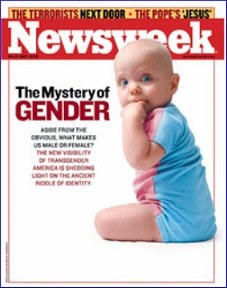NEWS RELEASE
NEWSWEEK
***************************** Newsweek explores the question: 'What makes us male or female?'
On the decision to let Jona Rose, who was born Jonah, a six-year-old kindergartner, live as a girl
'We wrung our hands about this every night,' says her dad, Joel. 'She has been pretty adamant from the get-go: I am a girl'
NEW YORK, (May 13) - To most of us, gender comes as naturally as breathing.
We have no quarrel with the "M" or the "F" on our birth certificates, Assistant Managing Editor Debra Rosenberg writes in the May 21 Newsweek cover "The Mystery of Gender" (on newsstands Monday, May 14).
But to those who consider themselves transgender, there's a disconnect between the sex they were assigned at birth and the way they see or express themselves.
Today's transgender Americans go far beyond the old stereotypes.
They are soccer moms, ministers, teachers, politicians, and even young children.
Their push for tolerance and acceptance is reshaping businesses, sports, schools and families.
It's also raising new questions about just what makes us male or female.
Rosenberg and a team of Newsweek correspondents report that although the numbers of transgender people are relatively few-the most generous estimate from the National Center for Transgender Equality is between 750,000 and three million Americans (fewer than one percent)- many of them are taking their intimate struggles public for the first time, like L.A. Times sportswriter Mike Penner who announced in his column in April that when he returned from vacation, he would do so as a woman, Christine Daniels.
Nine states plus Washington, D.C. have enacted anti-discrimination laws that protect transgender people - and another three states have legislation pending, according to the Human Rights Campaign.
Rosenberg writes that this month the U.S. House of Representatives passed a hate-crimes prevention bill that included "gender identity."
So, what is gender anyway?
Rosenberg writes that it is certainly more than the physical details of what's between our legs.
History and science suggest that gender is more subtle and more complicated than anatomy.
(It's separate from sexual orientation, too, which determines which sex we're attracted to.)
Gender helps us organize the world into two boxes, his and hers, and gives us a way of quickly sizing up every person we see on the street.
"Gender is a way of making the world secure," says feminist scholar Judith Butler, a rhetoric professor at University of California, Berkeley.
Newsweek reports that gender identity first becomes an issue in early childhood, as any parent who's watched a toddler lunge for a truck or a doll can tell you.
That's also when some kids may become aware that their bodies and brains don't quite match up.
Jona Rose, a six-year-old kindergartner in northern California, seems like a girl in nearly every way - she wears dresses, loves pink and purple and bestowed female names on all her stuffed animals.
But Jona, who was born Jonah, also has a penis.
When she was four, her mom, Pam, offered to buy Jona a dress, and she was so excited she nearly hyperventilated.
She began wearing dresses every day to preschool and no one seemed to mind.
It wasn't easy at first.
"We wrung our hands about this every night," says her dad, Joel.
But finally he and Pam decided to let their son live as a girl, Rosenberg writes.
Now, as transgender people become more visible and challenge the old boundaries, they've given voice to another debate - whether gender comes in just two flavors.
"The old categories that everybody's either biologically male or female, that there are two distinct categories and there's no overlap, that's beginning to break down," says Michael Kimmel, a sociology professor at SUNY-Stony Brook. So what's different in transgender people?
Scientists don't know for certain.
Though their hormone levels seem to be the same as non-trans levels, some scientists speculate that their brains react differently to the hormones, just as men's differ from women's.
But that could take decades of further research to prove, Rosenberg writes.
Rosenberg also writes that although transgender opponents have often turned to the Bible for support, not all people of faith would agree.
Baptist minister John Nemecek, 56, was surfing the Web one weekend in 2003 when his wife was at a baby shower.
Desperate for clues to his long-suppressed feelings of femininity, he stumbled across an article about gender identity disorder on WebMD.
The suggested remedy was sex-reassignment surgery-something Nemecek soon thought he had to do.
Many families can be ripped apart by such drastic changes, but Nemecek's wife of 33 years, stuck by him.
His employer of 15 years, Spring Arbor University, a faith-based liberal arts college in Michigan, did not.
Nemecek says she has no trouble squaring her gender change and her faith.
"Actively expressing the feminine in me has helped me grow closer to God," Nemecek says.
As kids at ever-younger ages grapple with issues of gender variance, doctors, psychologists and parents are weighing how to balance immediate desires and long-term ones.
For parents like Colleen Vincente, 44, following a child's lead seems only natural.
Her second child, M. (Vincente asked to use an initial to protect the child's privacy), was born female.
But as soon as she could talk, she insisted on wearing boy's clothes and soon wanted to shave off all her hair.
"We went along with that," says Vincente.
"We figured it was a phase," she says.
Vincente and her husband, John, consulted a therapist, who confirmed their instincts to let M. guide them.
Now nine, M. lives as a boy and most people have no idea he was born otherwise.
"The most important thing is to realize this is who your child is," Vincente says.
Rosenberg says that's a big step for a family, but could be an even bigger one for the rest of the world.
Read cover story at Newsweek.com. *****************************
